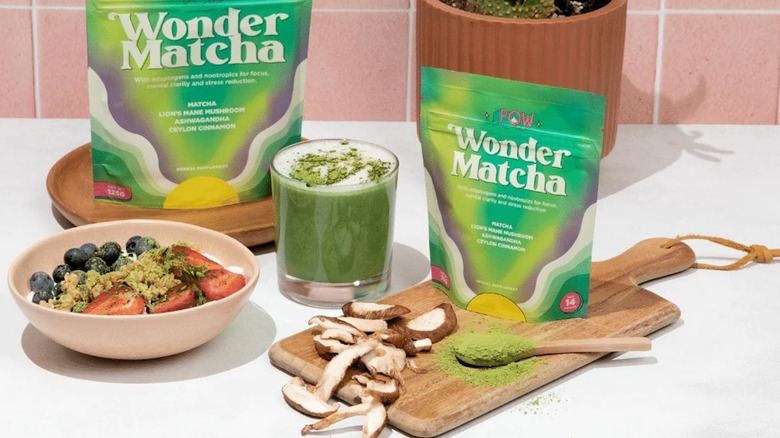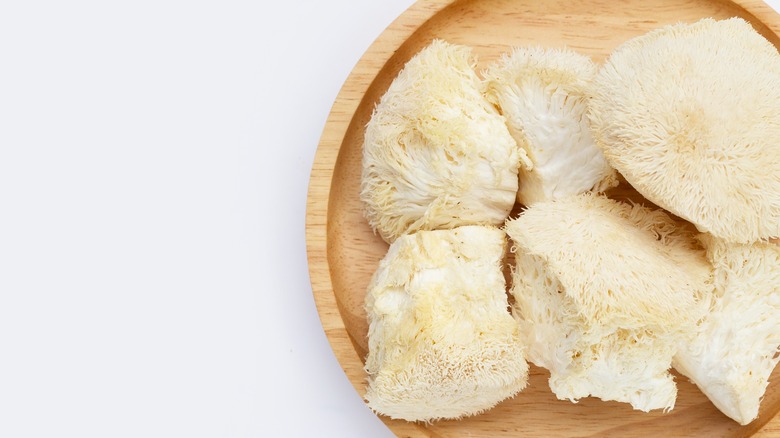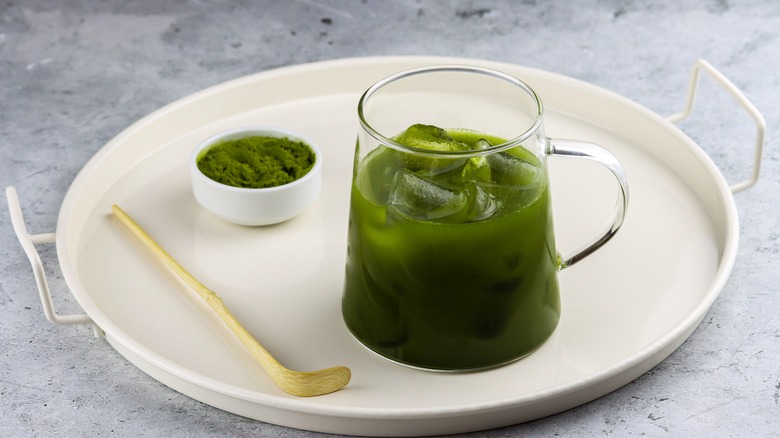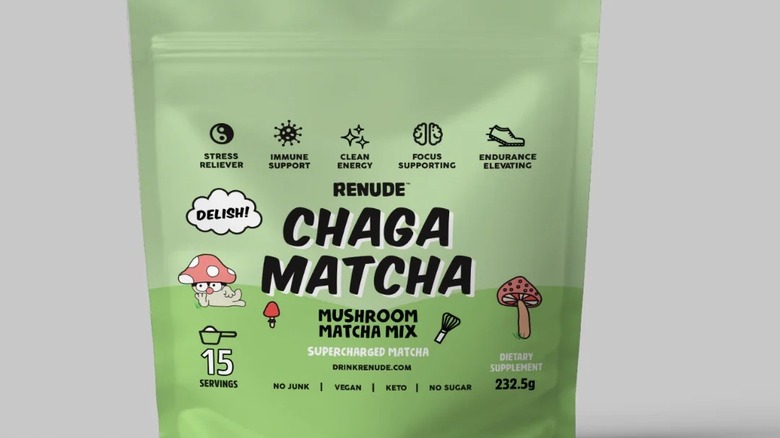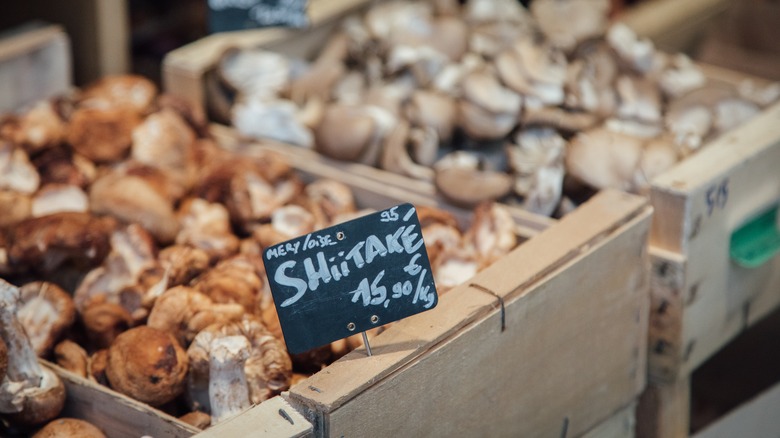Why Is Everyone Putting Mushrooms In Matcha?
Every health food must have its day, and a new star is on the rise: the functional mushroom. Also known as adaptogenic mushrooms or medicinal mushrooms (two different categories under the functional mushroom umbrella), these fungi make up a group of edible mushrooms with purported health benefits that can range from immune support to help with stress release (per Holland and Barrett). Common mushrooms in this category include lion's mane, reishi, cordyceps, chaga, shiitake, maitake, and turkey tail mushrooms.
Health food companies have begun adding functional mushrooms to everything from coffee alternatives to protein powder, but many have doubled down on the health angle by producing matcha mixed with these fungi. Matcha, which has already captured the imaginations of many in the wellness space as an antioxidant powerhouse, seems powerless to retain its purity in the face of this mushroom madness. But is mushroom matcha a match made in anti-inflammatory heaven, or a fresh variant of snake oil to lure in health-conscious consumers? Well, maybe, but we just don't know for sure.
What are functional mushrooms?
There are two categories of functional mushrooms. Adaptogenic mushrooms supposedly help our bodies respond better to stress, in theory reducing anxiety, boosting dopamine, or improving stamina during physical activity (per Healthline). Medicinal mushrooms, on the other hand, are largely being studied for their immune-boosting abilities, along with their antioxidant, anti-inflammatory, antibacterial, and antiviral properties (via the International Journal of Molecular Science). Where it gets a little confusing is that many of the same mushrooms, such as reishi, lion's mane, and cordyceps, are included in lists of both.
While there are some studies available to support the idea that functional mushrooms have health benefits, this research is limited and does not yet havethe breadth to be used as a guarantee for all the health benefits touted by functional mushroom advocates. Many of these supplements also contain only small doses of these mushrooms, meaning that you could end up spending a lot of money on supplements in return for minimal results. And as a lot of functional mushroom studies have used combinations of different mushrooms, making it difficult to isolate the effects of each one.
Where does matcha come in?
A slew of coffee and coffee alternative products using functional mushrooms have popped up over the last few years, courting consumers looking to cut down on caffeine or just boost their immunity. In theory, it doesn't sound that bad. Rich, bitter coffee paired with or replaced by earthy, umami mushroom powder. But these mushroom companies didn't stop at that.
Several brands (some of which also make mushroom coffee or coffee alternatives) have developed powdered mixes of matcha and functional mushrooms. They boast the benefits of both, as a kind of supercharged morning wake-up panacea.
Matcha, a form of high-grade green tea, was originally used ceremonially by Buddhist monks in Japan starting from the 12th century. But it became widespread globally in the 2010s as a popular latte riff, or as a flavoring for everything from matcha tea cake cookies to matcha overnight oats. The grassy flavor of matcha can be an acquired taste, but health-conscious coffee shop regulars quickly embraced it as a nutritious alternative to coffee — despite the fact that there are no known health risks to drinking coffee, except for potentially sending yourself into a caffeine-fueled panic attack (via the Mayo Clinic). In addition to being high in antioxidants, matcha may promote heart health, prevent cancer, protect the liver, improve brain function (per Healthline), reduce blood pressure, and alleviate stress (via Britannica).
Mushroom matcha
The brands Ryze, MUD\WTR, Clevr Blends, Pow, and Renude all make mushroom matcha beverages. Common ingredients include reishi, lion's mane, chaga, shiitake, turkey tail, and cordyceps, along with other health-branded ingredients like ashwagandha, cinnamon, MCT oil, Himalayan sea salt, and blue spirulina. Now, you're probably thinking: That sounds like a lot of ingredients to go into one drink.
And you would be right. The resulting flavor is intense and confusing, with the fresh green taste of matcha lopsided by earthy mushroom powder. Some need to be heated in order to mix them into water or milk, and the flavor of heated mushroom matcha is a potent one you likely won't forget.
These brands generally recommend consuming their products daily in order to see the full results, which is a lot of commitment (not to mention money) to ask from your average nine-to-fiver. But they also promise immediate benefits, which seems somewhat counterintuitive. While technically cheaper than many cafe-made latte drinks, they're still quite expensive — especially if drunk every single day.
Just drink your matcha latte
The global functional mushroom market is anticipated to reach over $19 billion by 2030, showing that people are definitely interested in this kind of product. But a lot of this popularity can be framed as a commodification of ingredients used in ancient Asian traditions for the American wellness market. Matcha, once a ceremonial beverage consumed by monks in Japan, has been co-opted as a health drink — while lion's mane, a staple of Chinese medicine, has been rebranded as a superfood that can turn you into a corporate sage with endless focus and peace of mind.
But while both matcha and functional mushrooms may offer some health benefits if consumed regularly in significant doses, neither is likely to cure all that ails you, even when paired together. And even if you do want to consume both for their potential health benefits, there's no reason it has to be in the same cup. Functional mushrooms like shiitakes, maitakes, and lion's mane are all edible and can be consumed as part of recipes. And there's nothing like a good old-fashioned matcha latte to liven up your afternoon.

